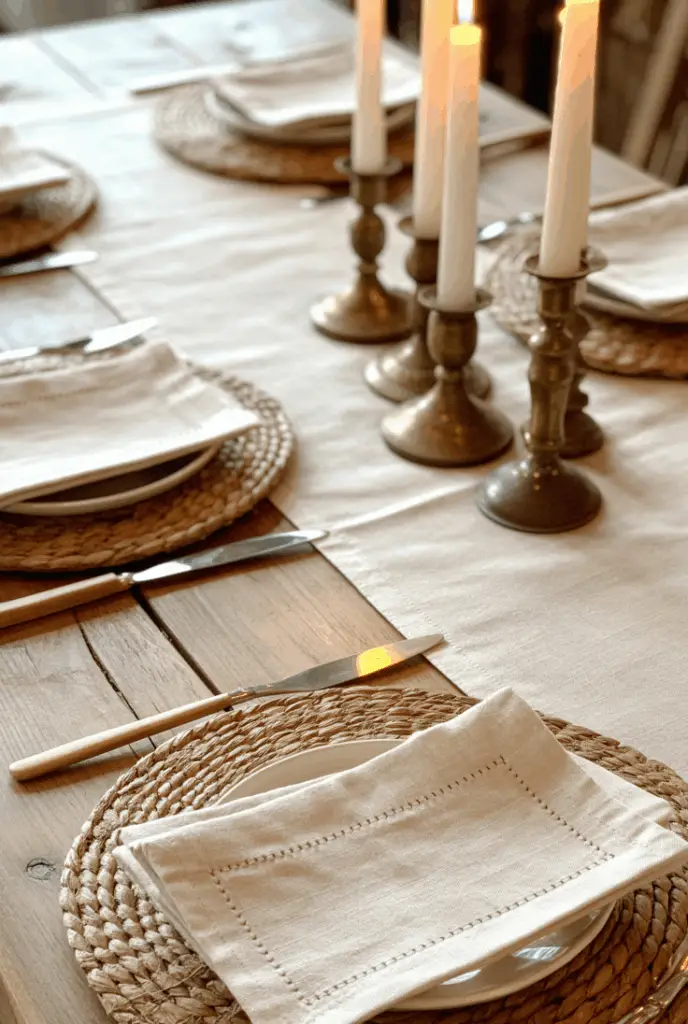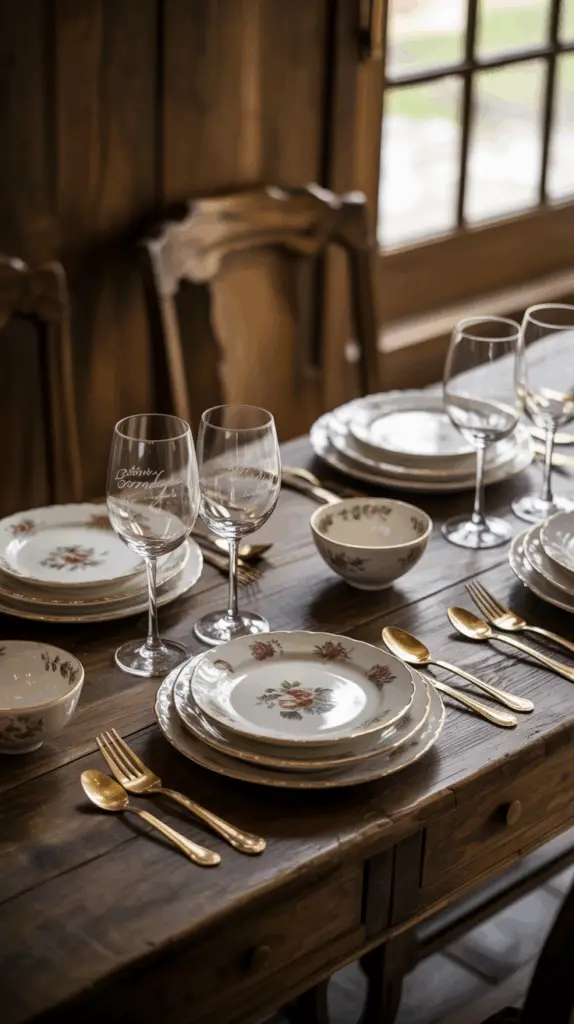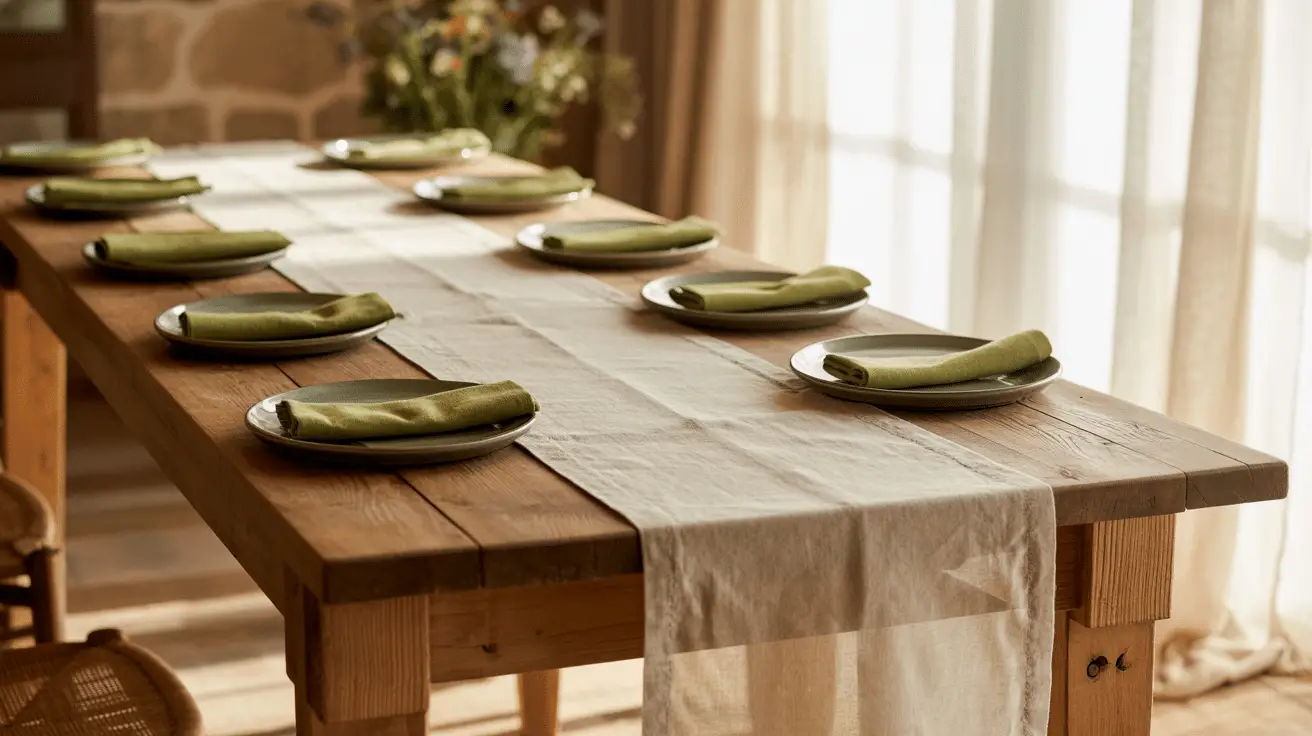Elegant French Country Dining Room Tablescape Ideas for Effortless Charm
Table of Contents
Introduction:
There’s something unmistakably enchanting about a beautifully set French country table. With its soft layers, rustic elegance, and refined imperfection, a French country dining room tablescape isn’t just about decoration—it’s about storytelling. It whispers of sun-drenched Provence afternoons, slow meals savored with loved ones, and an aesthetic that celebrates nature, heritage, and charm.
In an age where entertaining can often feel over-polished, the French country style invites us to slow down and embrace warmth over perfection. It thrives on lived-in beauty, timeworn textures, and a curated mix of old and new. Whether you’re hosting an intimate dinner party or simply elevating your everyday dining experience, crafting an elegant French country tablescape adds richness and meaning to the moment.
This guide explores everything you need to create a stunning French country-inspired dining setting. From selecting the right linens and dishware to styling centerpieces and layering textures, each element contributes to the cohesive charm of the space. You’ll discover practical tips, visual guides, and design inspiration that evoke the essence of French countryside living—effortless, soulful, and forever elegant.
Build a Natural, Muted Color Palette as Your Foundation
The beauty of a French country tablescape begins with its color story. Rooted in nature and aged simplicity, the palette often features muted, timeworn tones—soft creams, dove greys, dusty blues, faded greens, and sun-washed whites. These hues are elegant without being stark and romantic without feeling fussy.
Unlike modern settings that often favor crisp contrast, the French country look leans into harmony. Begin with a base color for your linens or tablecloth—soft oatmeal, flax, or ivory works beautifully. Layer in accents through your dishes, napkins, or florals. A pale blue ceramic charger, an olive-toned linen napkin, or blush-hued florals can each add dimension without overwhelming the table.
Keep in mind that texture plays a role in how color is perceived. A cream linen tablecloth with a nubby weave feels different than a smooth cotton one in the same shade. Pairing matte finishes with glazed ceramics, distressed woods with polished flatware, creates a timeless richness.
Color Pairing Guide for French Country Tablescapes
| Base Color | Accent Suggestions | Style Vibe |
| Soft Oatmeal | Faded green, rust, warm gold | Rustic, earthy, autumnal |
| Pale Blue | Ivory, silver, soft rose | Light, breezy, Provencal |
| Dove Grey | Charcoal, dusty lavender | Sophisticated, muted, romantic |
| Antique White | Blush pink, brass, moss green | Classic, delicate, floral |
Choose Linens That Reflect Effortless Elegance
In French country design, table linens play a vital role in both beauty and function. A well-chosen tablecloth or runner can immediately ground the entire look, while coordinating napkins and placemats add soft layers and casual grace. The magic lies in selecting linens that look lived-in yet luxe—think crinkled washed linen or hand-embroidered cotton.
Start with a neutral base: an oversized linen tablecloth in oatmeal or ivory sets the tone. From there, layer on a rustic burlap or lace-edged runner to introduce visual interest. If your table is beautiful on its own—especially reclaimed wood or whitewashed finishes—skip the cloth and opt for a runner only.
Napkins should feel organic and tactile. Linen is ideal, especially when casually knotted or held with a vintage ring. Tuck a sprig of rosemary, lavender, or dried herbs into each napkin fold for a sensory detail that guests will remember.
Balance is key—if your tablecloth is textured, keep napkins and placemats simple. If your linens are plain, use napkin rings or stitched detailing for subtle flair. Ironing is optional. In fact, a softly rumpled finish is often more authentic.
Table Linen Styling Chart
| Linen Type | Suggested Material | Styling Note |
| Tablecloth | Washed linen, soft cotton | Let edges drape casually over sides |
| Table Runner | Lace, burlap, woven blends | Layer over tablecloth or bare wood |
| Napkins | Linen, cotton with hemstitch | Fold with herb sprigs or knotted ring |
| Placemats | Rattan, jute, quilted cotton | Use when no runner is present |

Use Antique or Vintage-Inspired Dishware for Timeless Character
Dishware is one of the most expressive elements of a French country dining table. Instead of ultra-modern or perfectly matching sets, look for pieces that feel collected and storied—floral china, embossed ceramic plates, vintage silverware, or hand-painted earthenware.
Start with a base layer of neutral chargers or placemats. Layer mismatched plates in coordinating tones: a scalloped-edge dinner plate, a blue-and-white transferware salad plate, and a simple ivory bowl can create a curated, romantic look. Mixing different sets adds interest and charm, especially when united by color or pattern family.
If you don’t have vintage pieces, look for reproduction dishware in ceramic or stoneware finishes. Matte glazes or lightly distressed edges echo the lived-in aesthetic. Avoid anything overly glossy or futuristic in finish.
Flatware should feel substantial and timeless—silver, pewter, or brushed gold work well. Add a unique touch with vintage cutlery or heirloom serving spoons. Keep glassware classic: etched crystal goblets, simple wine glasses, or vintage coupe glasses all add elegance without being overpowering.
Dishware & Tabletop Essentials Guide
| Element | Style Tips | Best Material Choices |
| Dinner Plates | Scalloped or floral edges | Stoneware, porcelain |
| Salad Plates | Contrasting color or pattern | Transferware, enamelware |
| Bowls | Neutral tones, soft shape | Matte ceramic, hand-glazed |
| Flatware | Traditional shape, aged metal | Silver, brass, vintage mixed sets |
| Glassware | Simple, fluted, or etched | Crystal, blown glass, recycled glass |

Style a Centerpiece That Reflects the Season and Mood
A centerpiece ties the entire tablescape together. In French country design, it’s rarely overly formal or structured. Instead, centerpieces feel organic—built from nature, antique vessels, and thoughtful restraint.
In spring and summer, opt for garden blooms like peonies, lavender, or wild daisies arranged loosely in a clay pitcher, zinc watering can, or aged ceramic vase. For autumn or winter, incorporate dried florals, berries, fruit, or even branches in muted seasonal tones. Apples in a woven basket, persimmons in a footed bowl, or sprigs of pine among candles all reflect the countryside charm.
Balance is key. Use a mix of heights—candles in brass holders, a lower floral arrangement, and smaller votives or dishes of fruit. Stick to odd numbers and vary your shapes and materials. Avoid using anything too tall or dense that might block views or conversation.
The charm of a French country centerpiece lies in its ease. You want it to feel gathered, not forced. Let petals fall. Let fruit rest unevenly. Perfection isn’t the goal—authenticity is.
French Country Centerpiece Styling Table
| Centerpiece Element | Ideal Vessels or Accessories | Seasonal Styling Ideas |
| Fresh Flowers | Clay jug, zinc pitcher | Lavender, garden roses, eucalyptus |
| Dried Florals | Ceramic vase, wooden crate | Hydrangeas, thistle, wheat stalks |
| Fruits & Produce | Footed bowl, woven basket | Apples, pears, figs, mini pumpkins |
| Candles | Brass holders, antique lanterns | Tall tapers, tea lights, beeswax |
Add Decorative Accents and Layers That Tell a Story
To elevate your French country tablescape from beautiful to unforgettable, focus on the little details—the extra layers and decorative accents that tell a story. These finishing touches transform a pretty table into an experience.
Look for meaningful, personal, or antique-inspired pieces: a small ceramic bird tucked beside a place card, a linen sachet tied with ribbon, or a weathered breadboard used as a charger. Use books, candlesticks, or even fabric remnants as platforms to vary height and texture.
Place cards written in cursive or stamped on handmade paper can feel refined and intentional. Layer in found objects like seashells, feathers, or pinecones depending on the season. These tiny additions reinforce the rustic charm and evoke a sense of being thoughtfully hosted.
Avoid over-decorating. Let each element breathe. A beautifully wrinkled tablecloth, one or two meaningful accents, and cohesive colors will do more than any amount of cluttered décor.
Accent Layering Guide for Tablescape Personality
| Accent Type | Styling Ideas | Purpose |
| Place Cards | Deckled-edge paper, hand-written | Personalizes each setting |
| Natural Touches | Herbs, pinecones, seashells | Reflects season and nature |
| Antique Finds | Keys, stamps, tiny ceramics | Adds character and nostalgia |
| Platforming Items | Books, cutting boards, fabric | Varies height and draws the eye |
Conclusion
An elegant French country dining room tablescape is more than a visual display—it’s a heartfelt expression of warmth, heritage, and intentionality. It celebrates the balance between rustic and refined, curated and casual, nature and nurture. From muted palettes and textured linens to charming dishware and seasonal centerpieces, every detail contributes to a setting that feels both timeless and deeply personal.
What makes this style so compelling is its invitation to slow down—to savor not only the food but the atmosphere, the story in every object, and the care behind each layer. With a few thoughtfully chosen elements, you can create a dining experience that evokes the spirit of the French countryside in your own home—graceful, grounded, and unforgettable.

